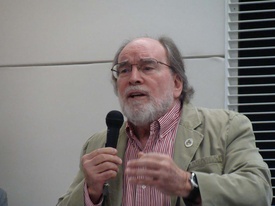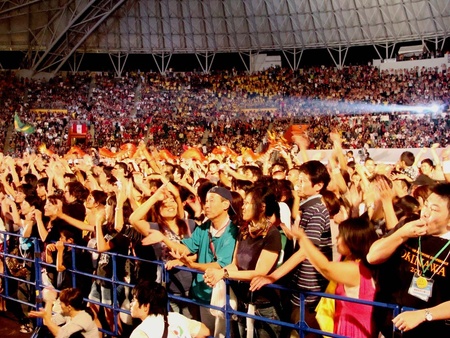Thousands of People from Brazil and Hawaii Gather for This Huge Event
The next thing I think of after Mr. Shimoji announcing his candidacy for the contentious governor’s election centering around the Henoko Base issue, is a fresh and new strategy involving Nikkei.
In late October of 2022, Naha will host the 7th Worldwide Uchinanchu Festival. The networks built here have enabled a plan to gather voices from the American Uchinanchu community to voice opposition to the Henoko issue.
Once every five years since 1990, Nikkei with Okinawan roots gather in Naha for the event. The main aim of this event is to develop international networks that connect these people together. Normally people just from Brazil make up over 1,000 guests, and people now living in Hawaii or other places in North America make up even more participants.

In 2011, I covered the 5th Worldwide Uchinanchu Festival. The governor of Hawaii at that time, Neil Abercrombie, arrived in Naha with several Okinawa Nikkei in a chartered jumbo jet.
Listening to his speech in English, when he revealed that “When he was little, he thought the word ‘Kanashiro’ meant ‘restaurant,’” I joined in with the crowd’s raucous laughter. The same island people from throughout the Pacific could understand even this Hawaiian’s speech.
The festival overflowed with Hawaiian-ness. Okinawan Nikkei in Brazil made up 1,000 participants, but Nikkei in Hawaii made up equal numbers. And they even chartered two whole planes to travel for the occasion. I tried to comprehend their emotional attachment to it.
Hawaii Pacific Press newspaper editor-in-chief, Mr. Kazuo Nakamine, reported at an international forum themed as “Immigrant Society as seen by Foreign Nikkei Newspaper Reporters,” hosted by Ryukyu University Migrant Research Division, that the Nikkei and Japanese population of Hawaii has reduced to 28% of its total. I doubted my ears when I first heard this fact.
So, I asked Mr. Nakamine, “What was the percentage when Nikkei and Japanese were here in their greatest number?” He responds, “About when the Pacific War broke out, Nikkei made up 44%, almost half, of the population of Hawaii.” They were undeniably a majority minority, and even now are about one-third of the population. The Hawaiian Governor must have decided to participate in the Competition because he regards this as a core group of the majority minority in Hawaii.
If so, we can think of ways for him to fight with us. The base issue is not only Okinawa’s problem, but a problem for parts of the USA, such as Hawaii and Guam as well. So, the Americans in those places should band together and protest the White House’s decisions. If their lobbyists and political coordinators would become American Uchinanchu, we would have a much stronger basis for opposition.
I remember well that in 2018 Hawaiian resident and Yonsei Mr. Robert Kajiwara gathered over 160,000 signatures to petition the White House to openly announce its solidarity with anti-Henoko base demonstrators.
We must organize such movements in a more systemic way to move the United States from the inside out. If we are able to create a task force of about 20 officials in central government bureaucratic-level at city hall and to develop and implement a strategy to influence US public opinion, this could lead to a new possibility.
This is exactly what the Jewish, Korean, and Chinese communities do to influence public opinion in the US. Why aren’t the Japanese aren’t doing? It leaves me baffled.
Something else I still remember well to this day is, right after the Festival I visited my childhood home in Shizuoka. No one there even knew the Festival had occurred. It was such a large international event, but mainland Japanese media essentially ignored it. I believe the event has so much potential.

Worldwide Uchinanchu Festival to be held in Hawaii
The Worldwide Uchinanchu Festival has a policy to “not insert political topics that divide people,” but about 70-80% of participants are opposed to the Henoko base transfer, showing a great unity in the majority view. Perhaps they should make an exception for this particular political topic.
The 8th Worldwide Uchinanchu Festival will be held in Hawaii, where Okinawan Nikkei’s presence is greatly felt. I suggested to Mr. Shimoji, why not show off the Okinawan Nikkei’s presence in Hawaii to the rest of the U.S.? He responds, “From here on, we will have to do exactly that. Japan shouldn't think of diplomacy as something for the national government to do, but as a new diplomacy, something that extends to all who have roots in Japan across the globe.”
Hegemonic America’s movements affect the whole globe. In the last World War, even in Brazil, 6,500 Nikkei living in Santos, a majority of them from Okinawa, were forcibly removed from their homes within 24 hours. This tragedy was apparently put into motion on behalf of the U.S. government.
Throughout the war, Peruvian Nikkei were forcibly moved from Peru to the United States and interned the same as American Nikkei. I ask Mr. Shimoji if the Okinawa base issue is just an extension of the forcible removal of Nikkei, and he responds, “It really is. I’d like to create a new framework for current Okinawans and Nikkei around the world to communicate and share information,” with a determined look on his face.
How should this network be established? I ask, and he answers, “Okinawa Prefecture itself has no foreign policy department, so we should start one and extend branch offices to be in not just San Paulo and Hawaii, but also Taiwan and China as well. This is the basis for our international network and it will support young peoples’ study abroad and business experiences.”
He emphasized that he “wants to greatly expand international exchange: for exchange students from abroad to come to Okinawa, for Okinawan children to study in Brazil or Argentina, or other parts of the world.” If he accomplishes this, it would be like restoring the islands to the time between the Ming and Qing Dynasties and when Okinawa was under the Edo Bakufu, when the islands had an independent and balanced foreign diplomatic policy that energized the Ryukyu Kingdom.
From Mr. Shimoji’s enthusiastic demeanor thinking about Nikkei communities, it appears that he is trying to work towards a future where the “Japanese policy” is not defined narrowly but includes Nikkei people as part of the collective Japan that is also entrusted with Japan’s future.
When I heard Governor Onaga greet Okinawan Nikkei from around the globe with “welcome back!” at the 5th Worldwide Uchinanchu Festival, I recalled the famous words of International Political researcher Masataka Kosaka: “England was a maritime nation, but Japan was an island nation.” At that moment I fully realized that Okinawa has already changed from an “island nation” to a maritime nation.
Perhaps with this Okinawan Governor’s race, we can change the shape of Japan from Okinawa.
*This article reflects multiple valuable contributions from Mr. Akira Miyagi, representative of the Brazilian Okinawa Kenjinkai’s Immigration Research Juku.
© 2022 Masayuki Fukasawa





